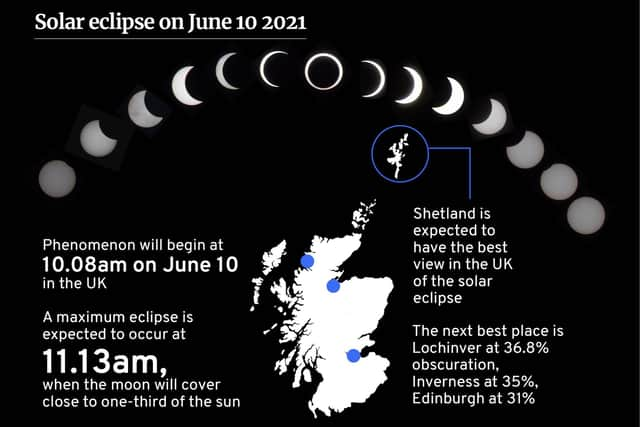What time is the solar eclipse today? When 2021 partial eclipse takes place - and how to watch safely from UK
and live on Freeview channel 276
Today, 10 June, the first solar eclipse of 2021 is set to take place - and it’s not just any solar eclipse, but a rare “ring of fire” natural phenomenon.
This is everything you need to know.
When is the next solar eclipse?


2021’s first solar eclipse will occur on Thursday 10 June.
The solar eclipse is actually a rare “ring of fire” eclipse, or what is known as an annular eclipse.
Advertisement
Hide AdAdvertisement
Hide AdNASA explains that an annular eclipse is “a solar eclipse in which the moon’s antumbral shadow traverses earth (the moon is too far from earth to completely cover the sun). During the maximum phase of an annular eclipse, the sun appears as a blindingly bright ring surrounding the moon”.
According to EarthSky, from any point along the annular solar eclipse path, the middle or annular or “ring of fire” stage can last a maximum of three minutes and 51 seconds.


NASA has constructed a summary of all solar eclipses that will occur from 2021 through to 2030.
According to NASA, after 10 June, the next few eclipses will happen on 4 December 2021, 30 April 2022, 25 October 2022 and 20 April 2023.
Can I see it from the UK – and what time does it start?
Advertisement
Hide AdAdvertisement
Hide AdThe eclipse will be seen by people around the world - provided there are clear skies, the 2021 solar eclipse will be visible in Canada Greenland and Russia
Other regions will also be able to see a partial solar eclipse, including Europe, North America, Asia, Arctic and Atlantic regions.
Starting from 10:10 BST, people in the UK will be able to view the partial eclipse.
In London, people will be able to see about 20 per cent of the moon covering the sun, and those in Scotland will see around 32 per cent.
Advertisement
Hide AdAdvertisement
Hide AdAlternatively, you can always watch the annular solar eclipse live stream instead.
We want to hear from you: let us know what you think about this story and be part of the debate in our comments section below
How to view a solar eclipse safely?
While the eclipse on 10 June is actually a partial eclipse, you still need to take care when viewing it, otherwise you can risk damage to your eyes.
The Royal Astronomical Society (RAS) says “viewing an eclipse is dangerous because the sun’s photosphere emits very intense visible light that can damage the light sensitive retina at the back of your eyes if you look directly at the sun without proper protection”.
Advertisement
Hide AdAdvertisement
Hide AdIt adds that “you only need to luck at the sun for a few seconds for your eyes to become permanently damaged”.
There are a number of ways that you can make viewing the phenomenon safe.
RAS says that “a simple yet safe way to view a solar eclipse is by making a pinhole viewer”.
All you need to make your own pinhole viewer are two pieces of white card.
Advertisement
Hide AdAdvertisement
Hide AdPoke a small hole in one piece of card and when the eclipse is happening, stand with your back to the sun.
Hold both cards up, with the one with the hole closer to the sun. The light through the pinhole will be projected onto the other piece of card, making the eclipse safe to view.
Alternatively, you can do a similar thing with a cereal box. Make a pinhole in one edge, point it towards the sun and you’ll see a small image of the sun projected on the inside of the box.
Comment Guidelines
National World encourages reader discussion on our stories. User feedback, insights and back-and-forth exchanges add a rich layer of context to reporting. Please review our Community Guidelines before commenting.
